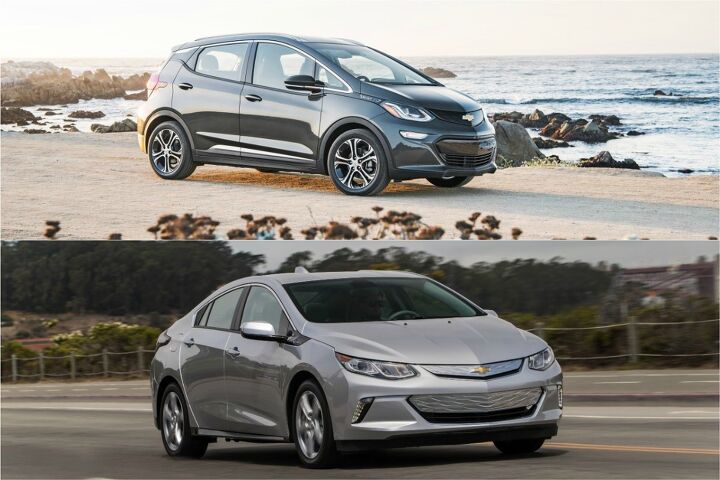Confirmed: Chevrolet's Bolt Loses Its Full Tax Credit In April, but Not the Doomed Volt

Good news for would-be Volt owners? Not really. Chevrolet’s soon-to-be-discontinued plug-in hybrid won’t live long enough to suffer the indignity of a halved federal EV tax credit. It’s dead in March, though remaining examples of the car everyone should want will no doubt linger on lots through the spring.
On Wednesday, General Motors announced, as expected, that it became the second automaker to pass the federal government’s 200,000-vehicle threshold, kicking off a three-month countdown to a chopped incentive.
The momentous moment came near the end of 2018, Automotive News reports, meaning a full quarter must pass before buyers stand to lose the $7,500 incentive offered on the all-electric Chevrolet Bolt and Volt. Come April, Bolt and remaining Volt buyers stand to receive just 3,750 of their fellow taxpayers’ dollars. Six months after that, the credit halves again, then vanishes.
Of course, General Motors execs probably aren’t toasting this green car milestone, as, much like Tesla (and Mitsubishi in Ontario), it will now have to resort to sweetening the MSRP pot on the manufacturer side. Then again, depending on the Bolt’s profitability, maybe a customer disincentive is a good thing for GM finances.
After passing the 200,000-eligible-vehicle mark in July, Tesla saw its full tax credit disappear on New Year’s Day, forcing the company to slash stickers by $2,000 across the board. Next in line to start the countdown is Nissan.
In base LT guise, the Bolt uses federal generosity to lower its MSRP five bucks below the $30k barrier. A halved credit puts the Bolt LT’s base price at $33,745. The improved 2019 Volt, condemned to death via falling sales (an affliction shared with its Detroit-Hamtramck Assembly factory mates) retails for $34,395 after delivery but before the $7,500 credit. It’s because of the Volt’s generous, 53-mile range that the car, which still packs a 1.5-liter four-cylinder for longer trips, qualifies for the full kitty.
Despite claiming its future lies in electric propulsion and computer control, GM’s short-term worries must lie with competitors who fall well below the tax credit threshold — most notably Hyundai, whose Kona EV crossover goes 258 miles between turns at the plug. Entry price for that vehicle, after incentives? An attractive $28,950.
[Image: General Motors]

More by Steph Willems
Latest Car Reviews
Read moreLatest Product Reviews
Read moreRecent Comments
- RHD They are going to crash and burn like Country Garden and Evergrande (the Chinese property behemoths) if they don't fix their problems post-haste.
- Golden2husky The biggest hurdle for us would be the lack of a good charging network for road tripping as we are at the point in our lives that we will be traveling quite a bit. I'd rather pay more for longer range so the cheaper models would probably not make the cut. Improve the charging infrastructure and I'm certainly going to give one a try. This is more important that a lowish entry price IMHO.
- Add Lightness I have nothing against paying more to get quality (think Toyota vs Chryco) but hate all the silly, non-mandated 'stuff' that automakers load onto cars based on what non-gearhead focus groups tell them they need to have in a car. I blame focus groups for automatic everything and double drivetrains (AWD) that really never gets used 98% of the time. The other 2% of the time, one goes looking for a place to need it to rationanalize the purchase.
- Ger65691276 I would never buy an electric car never in my lifetime I will gas is my way of going electric is not green email
- GregLocock Not as my primary vehicle no, although like all the rich people who are currently subsidised by poor people, I'd buy one as a runabout for town.


































Comments
Join the conversation
I think the truth about electric cars is more nuanced. If you ever wake up in an apartment in downtown Paris, open the window, and smell, you realize that there must be a great future for electric cars. But here in Ohio and in much of the US, they just aren't a sensible proposition.
I wonder how a certain bearded pretentious douchebag will try to spin this in the next Chevy commercial...